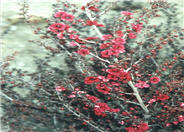
Common name:Red Damask Tea Tree
Botanical name:Leptospermum scoparium 'Red Damask'
Leptospermum sco. is an evergreen shrub or tree. 1/2 in. flowers are showy. Branches densely set with needlelike green leaves.
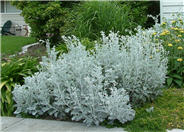
Common name:Dusty Miller, Silver Groundsel
Botanical name:Senecio cineraria
The Dusty Miller exhibits growth to 1' or more, with velvet gray leaves that have broad, roundish lobes. Yellow flowers heads appear through the middle of the plant during most months of the year. Head back occasionally to encourage bushiness.
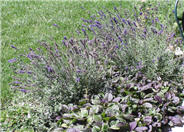
Common name:Hidcote Lavender
Botanical name:Lavandula angustifolia 'Hidcote'
This is a slow growing lavender that grows to 1ft. tall with deep purple flowers. It is drought tolerant, attracts hummingbirds and butterflies. -Cornflower Farms
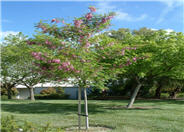
Common name:Purple Robe Locust
Botanical name:Robinia X ambigua 'Purple Robe'
Robinia X ambigua 'Purple Robe' is a deciduous tree that grows 25' to 40' tall and 12' to 25' wide with compound green leaves. It requires full sun, low watering (drought tolerant), and will live in poor soil. It has blue, pink, and purple flowers that bloom from April to June.
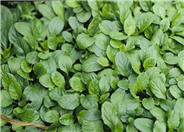
Common name:Ajuga, Bugle Flower, Carpet Bugle
Botanical name:Ajuga reptans
This colorful groundcover will grow in shade or sun with slightly moist soil. It is an evergreen with purplish rosettes that spread quickly on priplish stems. Blue bloom spikes cover these plants in April and May, and are 6-8" when blooming. This versatile groundcover can also be used in shady wildflower beds. -Holland Wildflower Farm
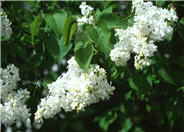
Common name:Common Lilac
Botanical name:Syringa vulgaris
Forms of the common lilac grow to a height of 15' and are equally wide, but can be kept smaller with careful shaping. The dark green leaves are roundish, oval and pointed that grow to 5" long. In the spring, clusters of fragrant, lilac flowers are borne. The plant requires full sun for proper growth.
| Designer: | Stroll Through the Garden |
Photographer: GardenSoft |
Soils and Compost:
Incorporate compost 6" into your soil to retain water, reduce compaction, feed earthworms, and provide valuable nutrients to your plants.
Water Saving Tip:
Group plants in your garden according to water needs (hydrozone).
Integrated Pest Management:
Drip and other smart irrigation delivers water directly to roots, allowing no excess water for weeds.

